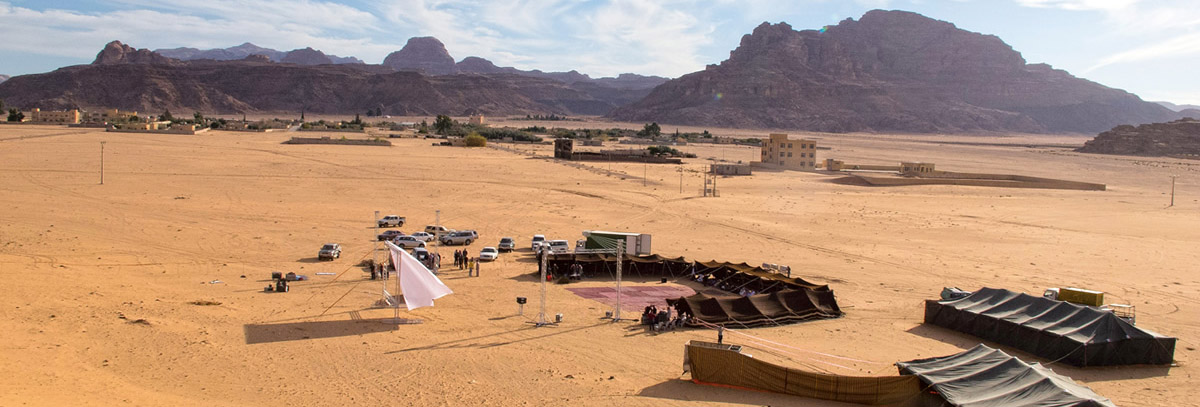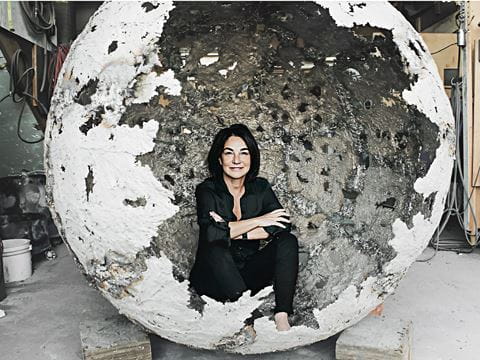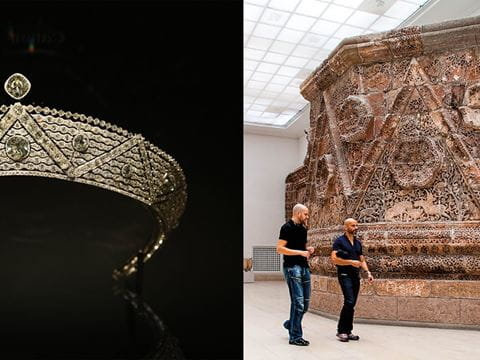
Now Playing: Jordan, Credit: Nadine Toukan
A decade ago, Nadine Toukan led Jordan’s Royal Film Commission and founded a workshop that launched a generation of Arab and especially Jordanian filmmakers. Often credited on screen as a producer, she likes to think of herself as “a connector.”
Until 2008, Jordan had produced only one truly home-grown feature film.

It was Egypt that blazed the trail for Arab cinema, followed by Morocco, Algeria and several other countries. Cairo’s film industry in the 1940s, ’50s and ’60s was prolific, and many productions from that time are recognized as classics. But those decades of dominance, in which Egyptian visual culture was ubiquitous across the Arab world, helped suppress the development of film production elsewhere.
Jordan’s first movie, Siraa fi Jarash (Struggle in Jarash), was released in 1957. Independently financed by a group of friends, one of whom, Wasif Alsheikh, was also the director, it has been described as part gangster flick, part tourist documentary. Scenes of rather wooden dialogue come interspersed, unusually for a drama, with location shoots showcasing Jordan’s natural and historical attractions.
But the breakthrough wasn’t sustained. For more than half a century, foreign directors shot in Jordan, most notably David Lean (Lawrence of Arabia, 1962) and Steven Spielberg (Indiana Jones and the Last Crusade, 1989). A handful of Arab films during that time had Jordanian connections, but there was scant institutional support for aspiring Jordanian filmmakers. That is, until a serendipitous chain of events about a decade ago brought Nadine Toukan back to her hometown, Jordan’s capital, Amman.
In one of the bright salad-and-smoothies cafés popular in Amman’s upscale neighborhoods, the soft-spoken, 40-something Toukan pauses for thought before answering my question about her career.
“I like to see myself as a creator, a connector of dots,” she says.
Credited as producer or executive producer on many of the movies that have flowed out of Jordan in the last 10 years, Toukan began her career in advertising. She changed direction in the 1990s to help establish Jordan’s first dot-com success, a news and entertainment portal for the early web called Arabia Online. But even after relocating to cutting-edge Dubai during the dot-com boom of 2000 and 2001, she knew that her heart lay elsewhere.
“I realized I wanted to roll up my sleeves and [work] instead of observing and commenting. That’s how I think of myself—as a contributor to the creation of possibilities. I wanted reach,” she says.

Back in Amman, creating content for the web dovetailed neatly into creating content for the screen. Toukan discussed making a documentary about the tribes of Petra with noted Jordanian anthropologist Rami Sajdi. They developed a proposal, only to meet a wall of skepticism from television and film-production companies.
“Everybody said: ‘Oh, who cares? You’ll never get it made.’ That, for me, was fascinating,” Toukan says.
Some might have capitulated. Others more confrontational might have raised a fight. But this playful, quietly steely character began searching for another way.
Her restlessness coincided with planning by the Jordanian government to create the Royal Film Commission (rfc), partly to entice foreign productions to the country, but also to foster the development of a homegrown cinema industry. Toukan was invited to head the rfc’s program to identify and develop local talent.
She knew she would be starting from scratch.
—Naji Abu Nowar
One of her first initiatives was to forge links with the Sundance Institute, a us nonprofit founded by Robert Redford to nurture filmmaking talent. In 2005 Toukan helped bring Sundance’s screenwriting lab—at which mentors and filmmakers are corralled together in a retreat to refine ideas—to Jordan.
“I was in England when my sister told me about the Royal Film Commission, and that a colleague of hers, Nadine Toukan, was [involved],” Jordanian director Naji Abu Nowar recalls when we meet on the breezy balcony of a film-production company in Amman.
“I wanted to make Arabic films, but I just didn’t think going back to Jordan was an option. There was no idea of a film industry there. I talked to Nadine, and she said I should apply to the Sundance Middle East screenwriters’ lab. It completely changed my life. Working with these writers gave me a new idea of what it was to be a screenwriter. Nadine is the reason I’m sitting here today.”
The lab became an annual event, and this year it celebrates its 10th anniversary in Jordan. Abu Nowar can pinpoint a number of leading filmmakers who have benefited from its influence, including first-year participants Cherien Dabis, Sameh Zoabi and Najwa Najjar. “They all went through” the lab, he says.

“Wadjda [the first Saudi feature directed by a woman, Haifaa Al Mansour] went through that lab. You name any Arab film that won awards, it’s gone through that lab. That’s a mark of the quality of the work—and that’s from Nadine.”
As the rfc began to draw international directors to Jordan, including Brian de Palma (Redacted), Nick Broomfield (Battle for Haditha) and Kathryn Bigelow (The Hurt Locker), it also launched a cooperative effort with the University of Southern California in Los Angeles to establish the Red Sea Institute of Cinematic Arts, or rsica, which offered the only master’s-degree program in film in the Middle East.
Toukan, though, was feeling the constraints of working in a public-sector institution. She left the rfc to face head-on the wall of skepticism inhibiting support for local filmmaking.
She met a California-based Jordanian filmmaker, Amin Matalqa, who showed her a script he was developing with a friend, Laith Majali. To Toukan, it looked promising. She began pitching to potential business backers in Jordan and gathering support from the scriptwriters’ contacts in Los Angeles.


The result was Captain Abu Raed, released in 2008 to critical acclaim. Directed by Matalqa, it’s a moving story about an elderly man working as a janitor in the Amman airport whose life becomes entangled with those of local children. As well as winning several international awards, Captain Abu Raed marked Jordan’s emergence as a contemporary filmmaking nation.
“Why did it take so long?” asks Toukan. “Permission,” she says with a smile.
“There’s a mindset that waits for permission to create,” she explains, adding that self-censorship inhibits an individual’s license to author a narrative by raising questions like: “Is my voice interesting enough? Is it worthy enough? Am I good enough?”
“That’s a phenomenon across the arts, I think. We didn’t wait for anyone’s permission.”
And this time, it wasn’t a one-off. With institutional recognition and, perhaps more importantly, growing informal support networks, other Jordanian filmmakers followed Captain Abu Raed’s lead. Notable among them were Mahmoud Al Massad, whose gritty urban documentary Recycle (2008) garnered international attention, and Mohammed Al Hushki, who made Transit Cities (2009) about a woman who returns to Amman after 17 years abroad to find her family and the city changed. Transit Cities took home two prizes at the Dubai International Film Festival. Toukan’s goal of creating a viable, skilled, experienced Jordanian film community was coming closer—aided by a film fund administered by the rfc that was extending vital support to local writers and directors , as well as backing by individuals such as the late Ali Maher, an rfc commissioner and advocate of the creative arts.
Fadi Haddad explains how he approached Toukan in 2010, at his graduation from rsica, with an idea he’d developed with fellow student Nadia Eliewat.
The pair had expected to wait “five or six years” for the chance to move it to the screen, but “Nadine read the script and [asked to] be executive producer,” Haddad recalls. “She has this vibe that [means], ‘We’ll make it happen.’”
This time, the result was When Monaliza Smiled, a romantic comedy about an unlikely relationship between a dour Jordanian office worker and a cheery Egyptian teaboy. Shot in Amman and released in 2012, it was a hit across the region.
“I don’t think [the film] would have happened without Nadine,” says Haddad, Monaliza’s director, who now teaches film at the American University in Dubai.

Toukan “was always there day to day, to give feedback and supervise in casting, locations,” he adds. “But she wasn’t trying to act the boss. She would say, ‘This is Fadi’s project; we’re helping him do his film.’ I always remember that.”
“Monaliza stirred a lot of discussion in Jordan,” says Omar Razzaz, until recently head of the board of trustees at the King Abdullah iii Fund for Development (kafd), a Jordanian nongovernmental organization devoted to civic empowerment. The film dealt with “several taboos to do with foreign workers, class, identity [and gender] issues,” he says. “It brought a lot to the surface.”
Razzaz notes that establishing a Jordanian film industry doesn’t just have a cultural impact. “From a strictly economic perspective, the value-added of the cinema industry is huge, because you have so many linkages to it—music, design, fashion, tourism, culture. You can market a whole country through what you produce [on screen],” he says.
Jordan’s royal family has long had an intimate connection with screen entertainment. King Abdullah’s parents met on the set of Lawrence of Arabia, and the king himself even had a nonspeaking role in one episode of the television series Star Trek: Voyager.
But Toukan, nurturing intense drive beneath her mild, cheerful exterior, is impatient with a filmmaking model that depends on royal or state patronage. For her next project, she broke that mold by successfully pitching for funding from a range of local, private-sector business sources. The kafd also became a key financial backer for Theeb (2014), directed by Toukan mentee Abu Nowar.

This latest Jordanian hit—whose Arabic title means “Wolf”—follows an English army officer through the deserts of northern Arabia during World War i, as seen through the eyes of a Bedouin boy caught up in events beyond his control. Theeb is an intimate, acutely well-observed drama of relationships, described by Hollywood’s Variety magazine as “a classic adventure film of the best kind, and one that’s rarely seen these days.… A bedouin western shot in the Jordanian desert with real bedouins.”
“Nadine is someone who has earned her stripes,” says Razzaz, calling her “very driven, very creative” and very dependable. “That’s comforting, to know you’re talking to a person that [isn’t] going to drop this next year.
“Kafd has always distinguished between financial return and social return,” Razzaz says, noting that the success of a film can be measured in more ways than box-office take. “We quickly saw how [Theeb] was changing mindsets in [rural communities] about the possibility you could be an actor and not just a bus driver or security guard.”
This social return can also be seen on the film set. In 2006 crews filming in Jordan were less than one-third Jordanian. By 2014 two films—Rosewater, directed by American talk-show host Jon Stewart, and Kajaki, directed by Britain’s Paul Katis—had been shot in Jordan with 70-80 percent Jordanian crews. From set construction to costume design, film is expanding the nation’s skills base.
Bassel Ghandour got his break on Captain Abu Raed, where he was Toukan’s production assistant. He then secured a position on The Hurt Locker and parlayed that experience into co-writing Theeb. Now he runs his own production company in Amman.

“To help nurture a system that had people who really knew nothing—all they had was ambition to work in film—that really takes vision,” he says of Toukan.
There have been, and remain, obstacles: rsica has folded, and no Jordanian movie has yet turned a profit. But Theeb is well on the way to that breakthrough, having capitalized on its festival successes to secure 2015 general releases in the uk and the us, cinema’s two biggest and most important markets.
The wider benefits excite many.
“I absolutely see a return in intangible ways,” says Saad Mouasher, vice-chairman of Jordan Ahli Bank. One of Theeb’s financial backers, he voices full-throated support for Toukan’s work in the industry.


“When you’re producing a movie, you’re investing in local capabilities. Movies are a way for us, in the Arab world, to reclaim our heritage,” he says. “I would invest again. Until the industry matures, issues such as supporting the arts, freedom of expression and creating our own narratives take precedence over [financial] return. It’s priceless, culturally. Nadine is one of the catalysts for positive change in Jordan.”
Between sips of tea in our bustling café, I ask Toukan if she is trying to change her country. After a pause, she nods and says, “Yes, I am. We are. It’s a pleasure to do that. It’s one of the reasons I get up excited in the morning—the adventure of it.”
“You can see the stepping stones” on the way to success, she says. “That gives me great inspiration and motivation. A film movement will shift Jordan culturally and politically—the experience of going to a cinema with a bunch of strangers, laughing together, crying together, being wooed together, is extremely important for how a culture gets to be comfortable with itself.”
She remains committed to breaking molds and opening more creative pathways for Jordan—and Jordanians.
“My duty is to make good entertainment—and I love venturing into the unknown,” she says. “If the film industry in Jordan were established, I don’t know if I’d be this excited. It’s massive, unlimited opportunity. That’s really exciting for me. Less rules!”
About the Author

George Azar
George Azar is author of Palestine: A Photographic Journey (University of California, 1991), co-author of Palestine: A Guide (Interlink, 2005) and director of the films Beirut Photographer (2012) and Gaza Fixer (2007). He lives in Beirut.
Matthew Teller
Matthew Teller is a UK-based writer and journalist. His latest book, Nine Quarters of Jerusalem: A New Biography of the Old City, was published last year. Follow him on X (formerly Twitter) @matthewteller and at matthewteller.com.
You may also be interested in...

Meet Sculptor Marie Khouri, Who Turns Arabic Calligraphy Into 3D Art
Arts
Vancouver-based artist Marie Khouri turns Arabic calligraphy into a 3D examination of love in Baheb, on view at the Arab World Institute in Paris.
Cartier and Islamic Design’s Enduring Influence
Arts
For generations Cartier looked to the patterns, colors and shapes of the Islamic world to create striking jewelry.
Rediscovering Voices and Stories: A Conversation With the Editors of Muslim Women in Britain
Arts
When Sariya Cheruvallil-Contractor embraced Islam as a teen, she recognized a divide between her faith and its portrayal in some Western media in the 1990s. Determined to challenge stereotypes, she became a sociologist dedicated to what she sees as Islam’s empowering principles for women.